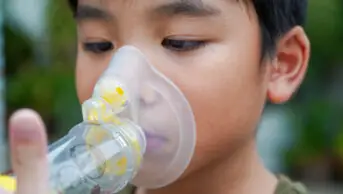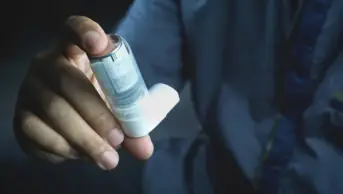
Shutterstock.com
Patients should be encouraged to return used or expired inhalers to community pharmacies for appropriate disposal, as part of “key actions” identified in updated NHS England ‘Green plan guidance’.
The guidance also says that a new metric will be added to the Greener NHS Dashboard, which charts the progress of NHS sustainability measures related to the reporting of average inhaler emissions per 1,000 patients in the first quarter of 2025/2026.
The refreshed guidance, published on 4 February 2024, helps trusts and integrated care boards (ICBs) meet NHS commitments to reach net zero. It follows guidance originally published in 2021, which asked relevant parties to develop green plans spanning three years from 2022/2023 to 2024/2025.
The updated guidance asks trusts and other NHS organisations to “refresh their green plans for the next three-year cycle”, with the aim of “ensuring every NHS organisation supports the ambition to reach net zero carbon emissions”, as well as “prioritising interventions that support world-leading patient care and population health, and reduce inequalities, while tackling climate change and broader sustainability issues”.
The guidance adds that significant progress towards net zero has been made between 2022/2023 and 2024/2025, partly achieved by “progressing high-quality, lower-carbon respiratory care, supporting patients to improve their lung health while reducing inhaler emissions by around 300 kilotonnes of carbon a year”.
In 2020, NHS England committed to becoming a net zero health service by 2040 for emissions it controls directly, and then to reach net zero by 2045 for emissions it influences but does not directly control.
Minna Eii, chair of sustainability for the Guild of Healthcare Pharmacists, said: “The action of returning used or expired inhalers to community pharmacies is such an easy ask to reduce additional release of GHG [greenhouse gases] in the atmosphere, but yet when surveyed around the UK the past few years by several ICBs, many patients and carers are still not aware they need to do so. Inhaler recycling and clinical incineration are carbon-intensive activities; therefore, this action in carbon terms doesn’t lead to net zero, but reduction of harmful GHG being released causing global warming.”
Tase Oputu, chair of the Royal Pharmaceutical Society’s English Pharmacy Board, said the updated guidance “strengthens the commitment to sustainability in healthcare and provides trusts with a clear framework to refresh their green plans”.
“This is a positive step towards net zero, and pharmacy teams are well-placed to support these efforts,” she added.
“Encouraging patients to return used inhalers highlights pharmacy’s key role in sustainability as this will help reduce waste, create opportunities to support patients with inhaler technique and reduce unnecessary prescribing. The new ‘average inhaler emissions per 1,000 patients’ metric will help track the environmental impact of respiratory medicines and drive a shift towards lower-carbon treatments.
“In 2025, we will launch our ‘Greener pharmacy toolkit’ to help pharmacy teams embed sustainable practices, including carbon calculators to measure and reduce their environmental footprint across medicines supply, use and disposal. By working together, we can reduce emissions, reduce medicines waste and improve healthcare sustainability,” she added.
In August 2024, a pilot at NHS Lothian in Edinburgh, resulted in a 300% increase in the number of inhalers being returned to community pharmacies for sustainable disposal. This was achieved by the addition of stickers to dispensing bags, to encourage patients to return inhalers to the pharmacy, as well as public-facing guidance.
Updated green plans must be submitted by 31 July 2025.


